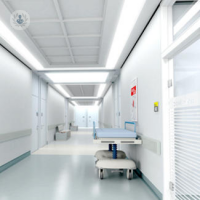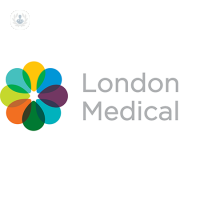What is irritable bowel syndrome?
Irritable bowel syndrome (IBS) is a functional disorder of the large intestine.

What are the symptoms?
IBS is characterised by abnormal movements in the muscles of the intestine, which cause discomfort and abnormal function, as well as constipation and diarrhoea alternately. IBS can also provoke abdominal pain, gas, bloating and changes in bowel habits.
What are the causes of irritable bowel syndrome?
Irritable bowel syndrome is usually associated with stress-related problems, although it has been shown that stress does not provoke it, but rather increases its effects. The exact causes of IBS are not clear, although it may occur after an intestinal infection.
This condition is often confused with inflammatory bowel disease (IBD) which, unlike IBS, is caused by the abnormal structure of the colon.
Can irritable bowel syndrome be prevented?
IBS is different in everyone and while the condition itself cannot truly be prevented, it can be avoided after diagnosis through certain lifestyle changes and management of the symptoms. For example, if you have IBS, it is not recommended to skip meals or eat later than you usually do, in addition to not rushing meals or eating too quickly. Avoiding spicy foods or ‘trigger’ foods can also help to keep IBS at bay. Many people with IBS prefer to cook their own meals as it means they can fully control what they are eating, thus avoiding triggers.
How is IBS treated?
For the diagnosis of irritable bowel syndrome, there is no specific test, but it is necessary for the doctor to rule out other conditions in which symptoms are similar. Therefore your doctor may arrange for blood tests or stool samples to be taken to make sure the right diagnosis is given.
Although there is no cure for IBS once diagnosed, as it is a chronic condition, certain measures can help to alleviate the symptoms:
- Try to find ways to help you relax
- Get plenty of exercise
- Keep a food diary to help you monitor triggers
- Eat foods which are easier for you to digest
- Use over-the-counter medication to control symptoms such as cramp and diarrhoea
Irritable bowel syndrome (IBS)
Dr Aathavan Loganayagam - Gastroenterology
Created on: 11-13-2012
Updated on: 11-01-2023
Edited by: Karolyn Judge
What is irritable bowel syndrome?
Irritable bowel syndrome (IBS) is a functional disorder of the large intestine.

What are the symptoms?
IBS is characterised by abnormal movements in the muscles of the intestine, which cause discomfort and abnormal function, as well as constipation and diarrhoea alternately. IBS can also provoke abdominal pain, gas, bloating and changes in bowel habits.
What are the causes of irritable bowel syndrome?
Irritable bowel syndrome is usually associated with stress-related problems, although it has been shown that stress does not provoke it, but rather increases its effects. The exact causes of IBS are not clear, although it may occur after an intestinal infection.
This condition is often confused with inflammatory bowel disease (IBD) which, unlike IBS, is caused by the abnormal structure of the colon.
Can irritable bowel syndrome be prevented?
IBS is different in everyone and while the condition itself cannot truly be prevented, it can be avoided after diagnosis through certain lifestyle changes and management of the symptoms. For example, if you have IBS, it is not recommended to skip meals or eat later than you usually do, in addition to not rushing meals or eating too quickly. Avoiding spicy foods or ‘trigger’ foods can also help to keep IBS at bay. Many people with IBS prefer to cook their own meals as it means they can fully control what they are eating, thus avoiding triggers.
How is IBS treated?
For the diagnosis of irritable bowel syndrome, there is no specific test, but it is necessary for the doctor to rule out other conditions in which symptoms are similar. Therefore your doctor may arrange for blood tests or stool samples to be taken to make sure the right diagnosis is given.
Although there is no cure for IBS once diagnosed, as it is a chronic condition, certain measures can help to alleviate the symptoms:
- Try to find ways to help you relax
- Get plenty of exercise
- Keep a food diary to help you monitor triggers
- Eat foods which are easier for you to digest
- Use over-the-counter medication to control symptoms such as cramp and diarrhoea


An easy-to-digest guide to IBD
By Dr James Andrew Robinson
2024-12-30
Do you often find your tummy aches and you regularly suffer from diarrhoea? These could be the signs of inflammatory bowel disease. Top gastroenterologist Dr James Andrew Robinson explains just how common the condition is and how the symptoms compare to irritable bowel syndrome. See more


FODMAP diet: how it helps IBS
By Dr Aathavan Loganayagam
2024-12-30
Bloated? Stomach cramps after you've eaten? It may be time to try the low FODMAP diet, a temporary eating plan that helps improve digestive symptoms. Read more from our expert gastroenterologist Dr Aathavan Loganayagam on the dietary treatment and how it works. See more


How to treat post-infectious ibs
By Dr Aathavan Loganayagam
2024-12-30
Post-infectious irritable bowel syndrome may appear suddenly as a bout of infection in the stomach and intestines, often as the result of bacteria such as Salmonella that causes food poisoning. Here, one of London's top gastroenterologists Dr Aathavan Loganayagam explains everything you need to know about the condition, including how long it lasts and how it can be treated. See more


Digestive enzyme supplements: do they really work?
By Dr Aathavan Loganayagam
2024-12-30
Perhaps you've been doing some research into supplements that can help alleviate symptoms of bloating and constipation related to gastrointestinal conditions such as irritable bowel syndrome. We asked one of highly-experienced London gastroenterologists Dr Aathavan Loganayagam for his expert opinion as to whether any of the digestive enzyme supplements out there on the market really do work or not. See more
Experts in Irritable bowel syndrome (IBS)
-
Dr John Martin
GastroenterologyExpert in:
- Colonoscopy
- Capsule endoscopy
- Inflammatory bowel disease (IBD)
- Polypectomy
- Irritable bowel syndrome (IBS)
- Bloated stomach
-
Dr Aathavan Loganayagam
GastroenterologyExpert in:
- Bowel cancer
- Endoscopy
- Indigestion (dyspepsia)
- Inflammatory bowel disease (IBD)
- Irritable bowel syndrome (IBS)
- Colonoscopy
-
Professor Stuart Bloom
GastroenterologyExpert in:
- Inflammatory bowel disease (IBD)
- Irritable bowel syndrome (IBS)
- Digestive diseases
- Acid reflux
- Food intolerance
- Bowel cancer screening
-
Dr Michael Mendall
GastroenterologyExpert in:
- Inflammatory bowel disease (IBD)
- Endoscopy
- Indigestion (dyspepsia)
- Irritable bowel syndrome (IBS)
- Liver disease
- Acid reflux
-
Dr Adam Haycock
GastroenterologyExpert in:
- Bowel cancer screening
- Acid reflux
- Inflammatory bowel disease (IBD)
- Irritable bowel syndrome (IBS)
- Colonoscopy
- Endoscopy
- See all

LycaHealth Canary Wharf
LycaHealth Canary Wharf
1 Westferry Circus, Canary Wharf. E14 4HD
No existe teléfono en el centro.
By using the telephone number provided by TOP DOCTORS, you automatically agree to let us use your phone number for statistical and commercial purposes. For further information, read our Privacy Policy
Top Doctors

Spire Little Aston Hospital
Spire Little Aston Hospital
Little Aston Hall Drive, Sutton Coldfield, B74 3UP
No existe teléfono en el centro.
By using the telephone number provided by TOP DOCTORS, you automatically agree to let us use your phone number for statistical and commercial purposes. For further information, read our Privacy Policy
Top Doctors

London Medical
London Medical
49 Marylebone High Street, W1U 5HJ
No existe teléfono en el centro.
By using the telephone number provided by TOP DOCTORS, you automatically agree to let us use your phone number for statistical and commercial purposes. For further information, read our Privacy Policy
Top Doctors
-
LycaHealth Canary Wharf
1 Westferry Circus, Canary Wharf. E14 4HD, Central LondonExpert in:
- Cardiology
- Dermatology
- Diagnostic Imaging
- Women’s health
-
Spire Little Aston Hospital
Little Aston Hall Drive, Sutton Coldfield, B74 3UP, Sutton ColdfieldExpert in:
- Bariatric Surgery
- General Surgery
- Orthopaedic surgery
- Robotic Surgery
- Diagnostic Imaging
- Ophthalmology
-
London Medical
49 Marylebone High Street, W1U 5HJ, Central LondonExpert in:
- Cardiology
- Adult Diabetes
- Child Diabetes
- Endocrinology
- General practice
- Ophthalmology
- See all
- Most viewed diseases, medical tests, and treatments
- Immunotherapy
- Alzheimer's disease
- Child nutrition
- Migraine
- Maternal mental health
- Paediatric rheumatology
- Autoimmune diseases
- Joint pain
- Nutrition
- Abdominal pain







